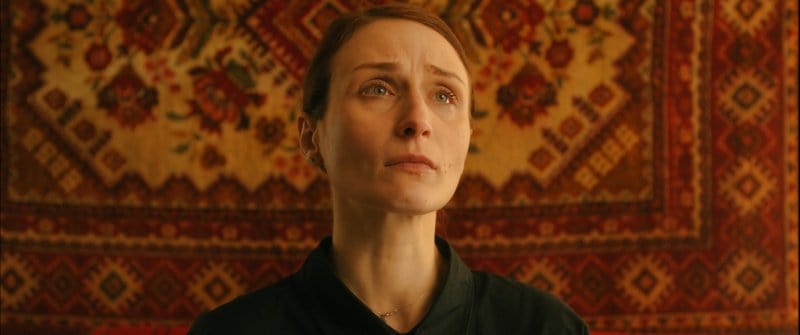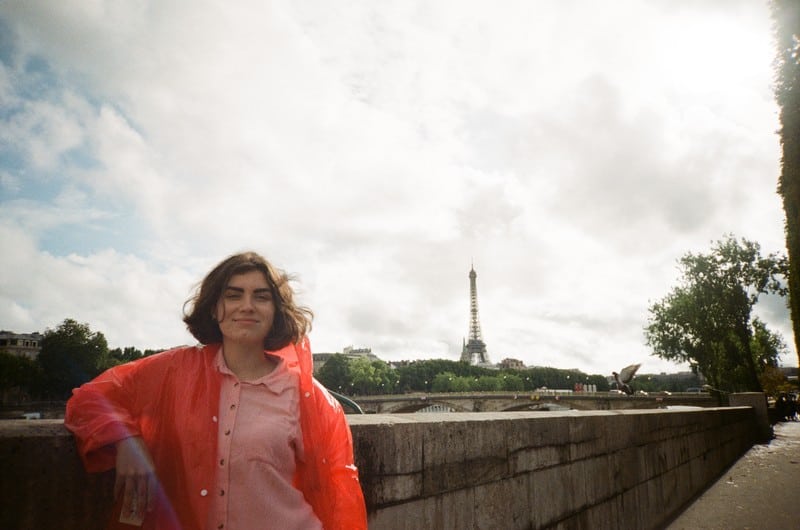Pomana
Reż. Anastasiia Lukova, Ukraina
Lidia, kobieta w podeszłym już wieku, pewnego ranka idzie do swojego męża Anatolija do szpitala i spotyka sąsiadkę Klarę, która “niechcący” zauważa niepomalowany płot Lidii, kobieta jest zaskoczona i ucieka. Po drodze zaczynają się jej wydawać sąsiedzi, którzy malują płot, więc wraca do domu i porządkuje swój drewniany płot. Tymczasem Anatolij umiera.
Wszyscy sąsiedzi zbierają się na pogrzeb, przyjeżdża córka Jeanne z synem Andriejem, Lidia rozpaczliwie ich poznaje, Jeanne bardzo współczuje matce, ale trzymają się od siebie z daleka. Gdy Jeanne dociera do pokoju z trumną, spotyka płaczącą kobietę, która zaczyna płakać, gdy tylko wchodzi na werandę. Córka całuje ojca, gdzie jest już Clara, wchodzi Lydia i siada obok sąsiadki, Clara zaczyna “współczuć” i przypomina sąsiadce o starym zwyczaju – “pomanie”, darze na cześć zmarłego.
Lydia biegnie do pokoju, gdzie Andrzej gra na telefonie, a Jeanne układa rzeczy. Kobieta chwyta swoje sekretne pudełko. Córka próbuje być delikatna wobec matki i pyta, co robi. Matka mówi z niepokojem, że zapomniała o “pomankach”. Jeanne śmieje się z matki z powodu starego zwyczaju. Nieoczekiwanie Andrzej pyta babcię o mołdawskie słowa, na co córka reaguje złością i upokarza matkę, mówiąc, że Mołdawianie są analfabetami. Matka jest urażona i daje Andrzejowi pieniądze na słodycze.
Kobieta rozdaje cukierki w pokoju z trumną, ale ludzie nie zwracają na nią uwagi, interesują się tym, co dzieje się w domu Lidii. Wychodzi z pokoju na werandę i podsłuchuje rozmowę sąsiadów, którzy krytykują Lidię za cukierki i postanawiają opuścić pogrzeb, jak gdyby od święta.
Tymczasem Jeanne podsłuchuje, jak ciemnoskóry miejscowy chłopiec uczy liczyć Andreya po mołdawsku. Kobieta wbiega do pokoju i uderza swojego syna, który tylko pobłaża. Lydia wraca do pokoju z trumną, gdzie jest tylko Klara, która z zachwytem patrzy na ślubne kieliszki. Sąsiadka niechcący chwali okulary i mówi, że to będzie dobra “pomana”. Kobieta wyskakuje z łóżka i proponuje, że jeśli powie, jakie to wspaniałe “pomany” roznosi się po całej wsi, to dostanie drugi kieliszek, a na razie jeden.
Jeanne spędza jedną noc z ojcem. Płacze, śpi, głaszcze Anatolija.
Rano. W domu Lidii zbiera się kolejka ludzi, kobieta rozdaje rzeczy nieznajomym z domu, Andriej pomaga babci. Córka przyjeżdża karawanem, ze złością zabiera matkę na werandę i próbuje jej wytłumaczyć, ale ona jest zainteresowana tylko “pomanami”, córka nazywa matkę świnią, zabiera syna i jedzie karawanem z trumną.
Wieczór. Lidia już wchodzi do domu, a Klara biegnie i przypomina o “drugiej” szklance. Kobieta wraca do pokoju, wyjmuje szklankę z talerzykiem i podaje szczęśliwej Klarze, która nagle zauważa małe pęknięcie i prycha na kobietę, bo “daje bity talerzyk jako pomanę”. Klara biega po wsi i opowiada wszystkim o takim wstydzie Lidii. Lidia siedzi w pustym domu i głośno płacze.
Lydia, a woman already aged, one morning goes to her husband Anatoliy to the hospital and meets a neighbor Clara, who “inadvertently” notices the unpainted fence of Lydia, the woman is surprised and runs away. Along the way, she starts to seem neighbors who paint the fence, so she returns to the house and tidies up her wooden fence. Meanwhile, Anatoliy dies.
All neighbors gather for the funeral, daughter Jeanne arrives with her son Andrey, Lydia desperately meets them, Jeanne is very sorry for the mother, but they are keep away from each other. While Jeanne reaches the room with the coffin, she meets a crying woman who begins to cry as soon as she enters the veranda. The daughter kisses her father, where already here as here Clara, Lydia comes in and sits next to a neighbor, Clara begins “empathize” and reminds the neighbor of the old custom – “pomana”, a gift in honor of the deceased.
Lydia runs to the room where Andrey plays the phone, and Jeanne lays things out. A woman grabs her secret box. Daughter tries to be gentle with her mother and asks what she is doing. The mother says with anxiety that she forgot about “pomans”. Jeanne laughs at her mother because of the old custom. Unexpectedly, Andrew asks his grandmother about the Moldovan words, to which the daughter reacts angrily and humiliates the mother, saying that Moldovans are illiterate. The mother is offended and gives money to Andrey for sweets.
A woman hands out candy in a room with a coffin, but people pay little attention to her, they are interested in things in Lydia’s house. She leaves the room to the veranda and overhears the conversation of neighbors who criticize Lydia for the candy, and decide to leave the funeral, as if from a holiday.
Meanwhile, Jeanne overhears how a dark-skinned local boy teaches to count Andrey in Moldovan. The woman runs into the room, and hits her son who is only indulging. Lydia returns to the room with the coffin, where there is only Clara, who looks delighted at wedding glasses. A neighbor inadvertently praises the glasses, and says what a good “pomana” it would be. The woman jumps out of bed, and offers consent, if she says what wonderful “pomans” she spreads to the whole village, then will get a second glass, and so far one.
Jeanne spends one night with her father. Crying, sleeping, stroking Anatoliy.
Morning. In the house of Lydia gathers a queue of people, a woman hands out things to strangers from the house, and Andrey helps her grandmother. A daughter arrives on a hearse, with angry takes her mother to the veranda and tries to explain to her mother, butshe is only interested in “pomans”, daughter calls mother a pig, takes her son, and rides on a hearse with the coffin.
Evening. Lydia already enters the house, as Clara runs and reminds of the “second” glass. The woman returns to the room, takes out a glass with a plate, and gives to happy Clara, who suddenly notices a small crack, and snorts to the woman, because of she “gives beaten plate as a pomana”. Clara runs around the village and tells everyone about such a shame of Lydia. Lydia sits in an empty house and cries loudly.


